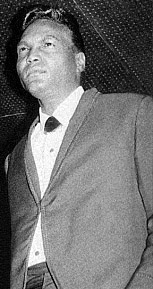ARTHUR ALEXANDER
You Better Move On
How could anyone have predicted Muscle Shoals, a northern Alabama town with about ten thousand residents, would be a hub of musical creativity where a diverse alliance of talented and celebrated entertainers would make some of the 20th century's most famous recordings? Yet the fabulous FAME studio made it such a place, over a half-century ago as well as now. Local discoveries like Jimmy Hughes and Percy Sledge, fellow Alabamans Wilson Pickett and Clarence Carter, out-of-state supporters Joe Tex, Etta James, The Tams and the amazin' Aretha, have all counted themselves among the artists who made Muscle Shoals magic in its early years; later came diverse personalities like Lubbock's Mac Davis, London's Rolling Stones, Carolinian Brook Benton, Utah's Osmonds, Ottawa's Paul Anka...I could keep going off the end of the page. In the 1950s, Rick Hall (and saxophonist Billy Sherrill and young songwriter Tom Stafford) nurtured an obsession with the country, R&B and rock music of the region stretching 150 miles in a northerly direction to Nashville and 150 to the west in Memphis. They knew this high school kid named Arthur Alexander, Jr...he was the guy who composed and sang "You Better Move On," the important recording that enabled Hall's FAME operation to eventually take its place alongside those musically mighty Tennessee cities.
Alexander was born and raised on the other side of the Tennessee River in Florence, Muscle Shoals' slightly larger neighbor; the Lord had plopped him right down where he was meant to be. His vocal experience in church led to a limited spot with a local gospel group, The Heartstrings. Arthur Sr., a guitarist who played in area blues clubs, set a secular example for his son ("Junior," as friends and family called him). With Henry Lee Bennett (using the name Charles Fenn), Junior penned "She Wanna Rock," delivered in a breezy country-rock style by Arnie Derksen for Decca in '59. In the summer of 1960 the 20-year-old Alexander's first hunk 'o wax appeared; "Sally Sue Brown," a strong country-blues track he'd written with Stafford and Earl Montgomery, came alive at Hall's first studio set-up above a drug store in Florence. Judd Records, a local label with a major hit to its credit ("Rockin' Little Angel" by Ray Smith) released it under the even shorter nickname June Alexander.
By 1961 Hall was making music in a converted tobacco products warehouse, the move from Florence to Muscle Shoals permanent, the location temporary. A four-track tape deck was purchased (making stereo masters possible from the get-go) and during the summer of '61 Alexander recorded a ballad-of-ultimatum he'd written, "You Better Move On" ('...you can buy her fancy clothes and diamond rings...but I believe she's a-happy with me without those things...still you beg me...to set her free...but my friend, that will never be...'); guitarist Dan Penn and his band The Pallbearers (they rode to gigs in a hearse) provided backing. Dot Records' Nashville rep Noel Ball (who'd discovered The Crescendos a few years earlier) bought the master and signed A.A. to the label. Rick Hall got enough money out of the deal to build a better FAME facility.

"You Better Move On" caught on, hitting the top 30 in April '62. Alexander's soulful country approach (employed around the same time by Solomon Burke, Chuck Jackson and others) was emulated on a wide scale over the next few years among both U.S. and U.K. singers. His contract with Dot severed any immediate association with Rick Hall and FAME as recordings for Dot were made in Nashville. Seasoned New York songwriters Barry Mann and Cynthia Weil contributed "Where Have You Been (All My Life)," a minor springtime hit. Arthur's impassioned performance on the summer single "Anna (Go to Him)" (actually sung as 'go with him') revealed a deeper baritone than on the first two Dot discs. Ahh, "Anna"...now there was an unassuming little masterpiece! One British band, it turns out, admired Arthur's songwriting ability and sound; John Lennon tried to emulate his vocal approach when covering "Anna" during the February 1963 session for The Beatles' first official album, Please Please Me. It was one of six covers on the LP (five of which had been hits in the U.S. by black singers), an inclusion that reaped extensive benefits.
Miami-based singer Steve Alaimo scored a hit in early '63 with Alexander's "Every Day I Have to Cry," as his songwriting began to overshadow his singing, a bit of a frustrating development. "Go Home Girl," "Dream Girl" and a remake of the 1959 Eugene Church hit "Pretty Girls Everywhere" stalled out of the gate as versions of "You Better Move On" popped up by a wide array artists (some of them British!); around the time his contract with Dot came to an end, the Rolling Stones saw fit to include the song on their December's Children LP. Arthur was becoming quite familiar to fans...that is, between parentheses in small print on the record labels of England's Invasion acts. He joined Monument Records in '65 and set about trying to reverse his slump as a singer. Producer Fred Foster and arranger Bill Justis worked with him on several 45s for Sound Stage 7, some cowritten with former Dot labelmate Dale Ward. Still, he was better served the next few years by admiration within the industry for his best-known songs. Memphis-based garage band The Gentrys and rocker-turned-C&W-crooner Bob Luman hit late-'60s charts with their own unique takes on "Every Day I Have to Cry." Billy "Crash" Craddock made a big country hit out of "You Better Move On" in '71.
Arthur turned to drug use in the later '60s but emerged around 1972 in Nashville and Memphis recording studios with fresh resolve to get his career back on track. Several efforts on Warner Bros. reveal a more countrified approach; he's been credited with being the first to release Dennis Linde's "Burning Love," an uncertain claim since his version was issued at about the same time Elvis Presley's rocking rendition became a million seller. Returning to Muscle Shoals, he mounted a minor comeback with "Every Day I Have to Cry Some" (adding the one word to the title as some had before him), which just missed the top 40 in 1975, and "Sharing the Night Together" (an Ava Aldridge-Eddie Struzick number that hit big for Dr. Hook two years later). By that time, "Junior" had quit the business, blaming it for fueling his personal weaknesses; he drove a bus in Florence for several years and was living in Nashville when he passed away in 1993 at age 53. Fans still cherish the work of Arthur Alexander through his many recordings and the countless remakes of his distinctive compositions.


